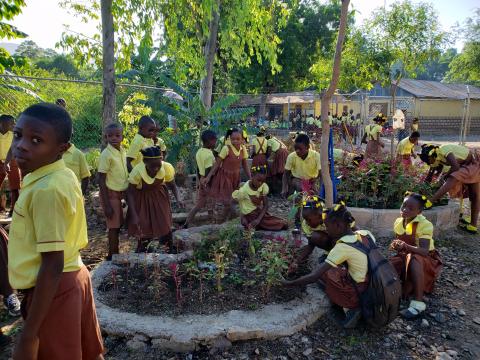
Abby Belt, a Maryknoll lay missioner in Haiti, considers how we can reflect the care of the Good Shepherd to others throughout our daily lives.
One of the recurring truths of 2020 was that sometimes it is all any of us can do to get by and provide for those we love. As reflected in today's Gospel on the Good Shepherd, we are offered choices in our daily work, which perhaps become more evident in trying moments.
We may sometimes act like the hired hand, who forgets the rest of the world to ensure his own wants and needs are met. Many such moments have presented themselves during the pandemic, when we've blurred the line between self-preservation and selfishness.
When Christ refers to sheep not of the fold, he speaks in part of those rejected by the Pharisees, who were leaders at that time. Many of us likely have an idea of leaders in our time who have not warranted the name, as they have given up on some of their people or never made an effort for others in the first place. The lives lost as a result are incalculable.
It is in such selfish decision making that we take the shape of the wolves, feeding off of others' fear and sorrow, taking joy and robbing light. It is easy to take advantage of another’s vulnerable moments for our own gain. For those of us in the United States, the divisive nature of our democracy has become even clearer. We can no longer pretend our system was built for all to succeed. We need to remember that we are responsible for others’ wellbeing as well as our own.
We do not get peace without justice. We do not get justice without taking an active and brave role in building a system that truly protects and supports the natural rights and dignity of every human, irrespective of creed, race, ethnicity, orientation, ancestry, and every other label we ascribe ourselves. We do not get to build this system without first demolishing the old, broken one. It is in this servant leadership we find our third option.
As expressed by Christ today, we are called to take on the courageous role of a good shepherd. In this calling described in the Gospel, we are presented an opportunity to build together and strengthen the foundation in which we have been set by Christ, our rejected stone which became the cornerstone (Acts 4:11). In today’s first reading, we see Christ in another light, as the Sacred Builder, who has marked each of his bricks and set us in a foundation of the strongest “agape” love.
Part of being a good leader is recognizing the gifts in others and not rejecting the very bricks Christ is using to build. This includes accepting ourselves. If our Savior deems us worthy material to build with, why would we look at ourselves as anything less than worthy and enough?
Christ laid his life down that he may rise again (John 10:14). Aside from this being a sign of his divinity, his willingness to die for us, imperfect as we are, re-enforces the foundation of faith and love in which we have been set. It is with this faith alive in us that we are called to be more than hired hands, and certainly more than wolves at night. We were born to be good shepherds – shepherds who find life in the work we are called to do, or who find what sets our souls on fire.
Make no mistake, choosing to live as a good shepherd is courageous. In doing so, we will be asked to live and work not just for ourselves, but for others, too. It requires being vigilant when wolves come and ensuring that we do not lose sight of the sacredness of others.
By no means are we called to single-handedly save this world. However, we are called to be a light that yet may save a day, an hour, a moment for others. We must continue to work for justice, for peace, for the good of others. My wise spiritual director recently asked me, what is the next loving act you may do? With this gentle approach, the vast array of problems in the world are not unbeatable. May we all find life in the work we do by sowing love and extending kindness, being the light and comfort of a good shepherd to others.
Photo courtesy of Abby Belt, MKLM.
